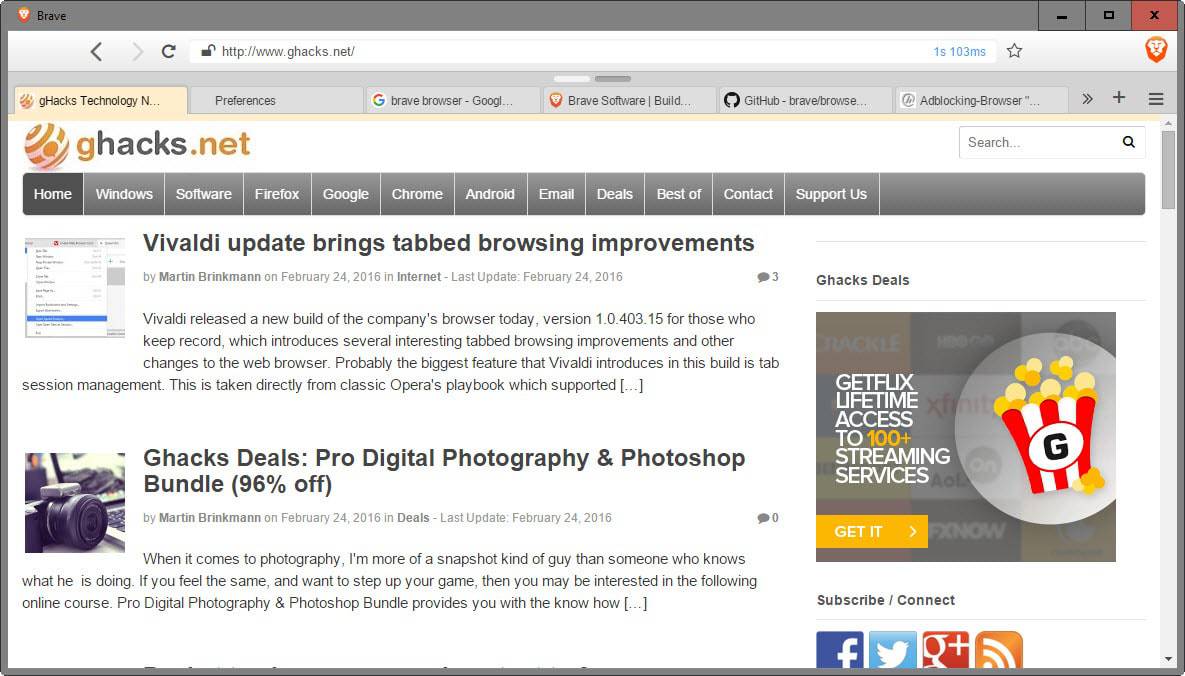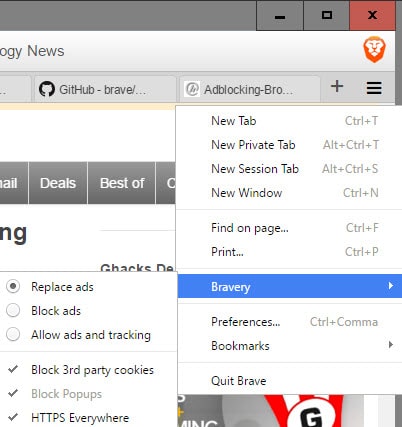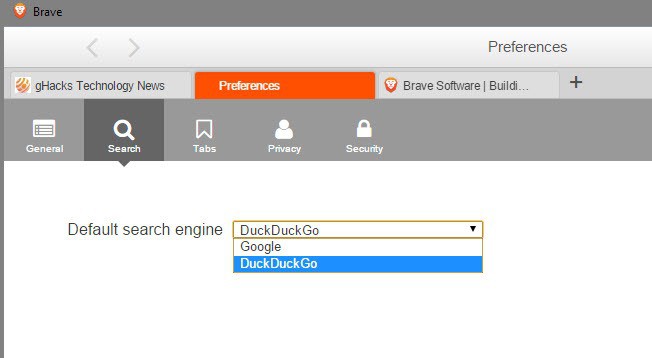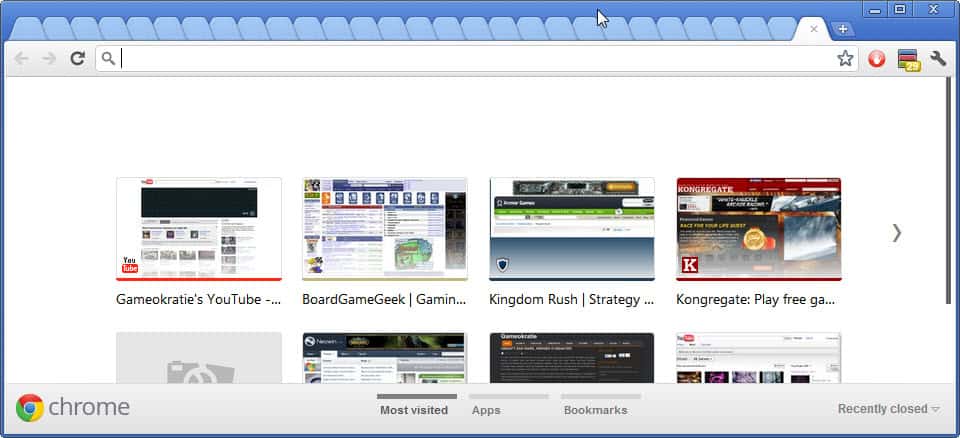First Look at Brave Browser for Windows

Brendan Eich's new web browser Brave has finally been released as a preview for the Windows desktop.
Initially released only for Apple's iOS platform, Brave is now also available for Windows, Linux, OS X and Android.
Download links for all (but the Linux) version are provided on the official Brave website, with both Windows and Mac downloads listed as developer version.
Brave promises faster, safer and better browsing thanks to integrated ad-blocking and other privacy-focused features.
Brave, under the hood, is a Chromium-based web browser which means that its performance and web compatibility is very similar to other browsers based on Chromium.
Brave Browser for Windows

A quick test revealed that it scores similar to other Chromium-based browsers in benchmarks and on HTML5 Test.
What sets Brave apart the most is its integration of privacy and ad-blocking features. Brave ships with a built-in adblocker that is turned on by default (unlike say Mozilla's Tracking Protection feature which is only available when Firefox users open a private browsing session and only after it has been enabled by the user).
Brave is highlighted as a fast browser thanks to these ad-blocking features, and the makers of the browser want to hammer the point home by displaying the page load time of the active website in the address bar.
When you load a site that displays ads, you will notice that those ads are not displayed. They are replaced on the page.
According to reports, Brave wants to replace some of the ads on the page with ads of its own in the future. These ads won't track users, and the revenue will be divided between Brave and the user with money paid out via Bitcoin.
Preferences

Brave users control the feature and related ones using the Bravery menu after clicking on the main menu icon in the top right corner.
There they find the following options:
- Replace ads (default) OR block ads OR allow ads and tracking.
- Block 3rd party cookies (enabled by default).
- Block Popups.
- HTTPS Everywhere
As far as other preferences are concerned, there are only a few available right now.

There does not seem to be an option available right now to clear the browsing history or cookies manually or automatically, let alone options to whitelist cookies, setting different search providers (other than Google or DuckDuckGo which ship with Brave), or make simple changes like changing the download directory.
Brave in action
Some things are different when you are using Brave. One that you will notice after opening more than six tabs in the browser is that it divides those tabs on pages.
You see that on the first screenshot of the article, the two bars underneath the address bar show that two tab pages are currently open in Brave.
You can modify this in the preferences but not disable it, and the maximum you can set it to is 20 tabs per page.
The idea was -- probably -- to avoid Google Chrome's tab squeezing issues. The browser does not scroll the tab bar but reduces the size of each tab open in it further and further until you cannot identify a single website anymore open in the browser.

Brave's solution improves visibility of individual tabs as they always retain the same width in the browser UI, but reduces it by separating tabs on pages which no option currently to display all open tabs directly.
The tab preview feature is different as well. You can move the mouse over any tab open in the browser to display it with transparency without switching to it.
The feature is limited to individual tab pages but can be quite useful if you want to quickly check sport scores, for updates or things like that without actually leaving the page you are on.
Closing Words
Brave is a browser in progress, and it will take a while before the first stable version of the browser gets released.
I like some of the ideas of Brave from a user perspective, and dislike others as a webmaster and publisher.
Brave's idea is to replace advertisement on websites with their own, and pay out the revenue earned to publishers, users and the company itself. This takes away control from the owners of the site as well as revenue.
While one could argue that the model is better than ad-blocking without any compensation, I cannot see it succeed as it is designed.
Now You: What's your take on Brave?





















always been a botnet
If you want Chromium based browser, download the one from the Chromium Authors with Ublock Origin only. Find it easily, type in Google “Chromium Woolys” and you’ll find the most stable version. Otherwise Opera is extremely good. That’s it. Now anyone releases Chromium-based browser.
Findx is now a private search engine in the Brave browser
https://get.findx.com/blog/findx-is-now-a-private-search-engine-in-the-brave-browser/
What’s with all these people using chrome? It’s basically google spyware. What’s wrong with Firefox? It always has been and always will be the best browser.
Brave still has a long way to go. The UI is below average, the built-in adblocker doesn’t block as much as ublock does and I’ve had lots of performance issues with it. Vivaldi is improving at a faster rate, I’m not advertising it, they can both go to hell for all I care, I’m just mentioning which one feels better to me.
I feel this way because there is one browser Cliqz that bought Ghostery and sort of want to achieve the same thing as Brave, it seems kind of far fetched.
how to uninstall this browser. It seems like a virus. If you uninstall, it will remain after rebooting.
I cannot believe this is even a browser that has any users at all. It’s useless, and I apologize for the harsh response. I just cannot see millions of people that could say that they do not require more than what this is. A blank page with a bookmark bar, a search/address bar and……? That about sums up Brave. I never saw anything so incomplete in a browser. I have to say I thought this was someone playing some sort of a joke.
You can’t remove critical things from a browser that almost the entire world has grown so accustomed to. People are STILL moaning on chrome about the menu bar being removed and it’s a fact, people don’t want to be without those options that bind the browser to the OS. The browser is the interface between the OS and the web so when you give absolutely no options in the browser and take away the interface that link the browser to the Operating System, you have successfully committed software suicide. This is not my opinion. It’s the reality that the software developers of web browsers refuse to acknowledge. When you finally realize a full featured web browser is more meaningful to the majority, then you can learn how to improve on that instead of trying to re-invent something else. If you want something this lightweight, get a tablet or something but please do not say this is ample for a desktop user with real needs. Not even 1 star would be earned on a rating here
As for the comment about taking a bunch of users from chrome, Firefox and IE? Yea, Vivaldi might. But Brave is not going to be able to get any support if it does not offer a better user interface with options that make sense. Now that Vivaldi has evolved people are longing once again for those options. And the way they support their browser is top notch. They listen to people and what they want. Then Vivaldi acts on those requests. When do you see any big name browser actually take people and their wish list so seriously? Vivaldi actually shows the entire team of developers and I can honestly say that if you have something important to say to them, they unite as a team to deal with it. It’s not going to be much longer where IE is gone. Chrome is still like Opera Next. Arrogant and refusing to listen to user requests.
But listen, this Browser here needs something. it is really bare bones minimum. Just enough to access a site. Come on. Be for real here. I will support it if it will give something very strong and worthwhile. But I can’t find it useful in it’s current state. I wish it would come to life as I would love to push those arrogant big name aside. Just to give the new guy a chance. Really.
I like the look, and I like the speed, dont like the no home button, Unfortunately in linux you cannot get by on one browser as netflix does not work with firefox and silverlight does not work with chrome hopefully brave solves this and I can use 1 browser for every thing on linux, until then its firefox with adblock plus and chrome with ublock
There isn’t an option or function to Import Favorites. This browser is dead to me until that’s made a reality.
Thanks for playing, Brave. I’d rather put up the annoyances of all the other browsers? Yeah, you betcha
Who is expected to use this? No one who uses Chrome will, others who have jumped off Chrome and onto other copycats have made their choice, and usually it is only a small difference and a skin change.
Why does everyone decide they need to have a browser, yet take the child’s way put of ding the hard work by starting with Chromium. It’s clear they are not paying attention, as the world needs NO MORE Chrome cloners.
Where are the real coders who came up with engines which, while maintained, blew the pants, and anything else off Chrome? You know, the ones who made Presto-based Opera. The last of the great browsers. [If that Chinese company buys Opera, you can bet if they have ANYONE with a brain, they’ll be resurrecting Presto Opera, and throwing the Chrome skinned Opera in the can.
Firefox is and always has been the best browser. Fx57 will rule them all.
the more adblocking, the closer we get to a non free internet.
the day when you have to pay to access sites will come.
That day would be called ‘The dark knight rises’ my friend… and you the BATMAN will save us! :D
It also can be said without a single doubt that Brave was not only created for offering a different concept of ads – it is the long planned revenge of Brendan against Mozilla.
Glad that he decided to stand up and challenge them, even if it is highly unlikely that he succeeds. But what will happen is that Brave will take quite a number of Firefox/Chrome/IE users away which are fed up with the changes what Mozilla constantly does to the built in features and customization options or who are fed up with the other mainstream browsers.
Brave and Vivaldi are becoming more and more the browsers of those Firefox/Chrome/IE users who just want to vote with their feet. And also without doubt, this will do indeed some damage mostly to Mozilla.
And my personal respect goes always with the ones who challenge so called standards and principles.
Name is a turn off. Seems too kiddy and like a biscuit or cookie. And no real interest in split of bitcoins. Chrome doing just fine. Too time pressed to go beyond IE when necessary but watching Edge if develops. It’s enough for now to bother with just one more.
Do worship duckduckgo.com search. Promising that it’s included. Thx for review.
The Brave Browser is one I would never try because of it’s add blocking, even tho I would like one to replace the Firefox Browser.
I never use add blockers because I appreciate the free sites that depend on the little revenue they get from adds. If a site I like goes overboard with it’s adds, the simple way is to move on to another site.
I like people like you, you keep the internet free for people like me who use adblockers. keep up the good work
There are many ‘issues’ surrounding this browser and its company’s founder. Business model aside, an unrepentant homophobe’s browser has no place on any of my computers.
http://www.theinquirer.net/inquirer/news/2336520/mozilla-defends-ceo-over-homophobic-claims
http://www.queerty.com/complaining-works-antigay-mozilla-ceo-brendan-eich-resigns-20140403
I do not think you know a real “homophobe”
Brendan Eich has donated in favor of traditional marriage. That was his good right. Why he should donate to something in which he does not believe? Why should he convert to something he is not interested in? He just has an opinion which differs from your opinion. This does not qualify Eich as a hater, he just has a different opinion. Or has he hunted you down or has he hit you with something? Or has he thrown curse words on you?
You better step down from your too giant horse and come back to reality again. Thanks!
I may try it only if they could provide a portable version..
Martin, it would be cool if you could do an article comparing the various Android browsers (and not just a few, pick at least 12 – 16 to compare) I’m currently using Firefox on Android as it has features that I would find difficult to do without. 1. It allows you to install uBlock Origin. 2. Allows you to install an export/import tab addon, which I find fairly critical to prevent data loss (Firefox session manager is not reliable) 3. Unlimited tabs. 4. Most importantly, I can switch tabs or minimised the browser while a YouTube video is playing and it will keep playing. Unfortunately Firefox on Android is also very sluggish, hence why I’d like to change. Tried Opera and Chrome, but found them woefully inadequate.
As webmaster and big site owner i don’t understand ppl like you, who make propaganda to use ad-blocking methods.
Would you prefer to ignore the issue? It is clear that things need to change, and you can either try and prevent the change from happening for as long as possible, or find other means to survive.
I think it’ll be interesting to see where “Brave” goes (hopefully for a new name–how about “Phoenix”?); certainly more interesting than watching Mozilla devolve into a black hole. Bitcoin? (yeah, whatever–keep it for the Bitcoin Poker and Bitcoin Monopoly sites).
Typical site owner(s)… thinks he/she/they have the right to decide what visitors to their sites can and cannot reject from *their own* desktop(s) (or whatever they’re using for browsing). People who associate with unscrupulous marketers don’t really deserve to have any say in what users choose to allow on their machines and devices. (All marketers are unscrupulous–it’s in their nature; that’s why they’re in marketing. “Hmmm, what can we do next to trick the public into giving us money [for nothing of real worth]…”)
Best case: Brave-Phoenix takes market share from Mozilla by providing that which Mozilla has been trying to destroy, namely, user choice. If anyone can do it, it’s Eich; he’s done it before.
Oh wow.. so many comments already. As a publisher, what I am most happy to see is that a lot of the commenters don’t agree with Brave’s revenue model. I would call it brazen stealing publisher’s ad money by replacing with their own ads. There is no possible justification of injecting their own ads on publisher’s pages, and making money from it.
To put it in perspective, let’s say Brave makes a software that they sell for $70. I brazenly copy that and start selling it to their own customers for $7 and tell Brave that I will give you $4 of that revenue. Will it be acceptable to Brave?
Brave has to end this stealing of publisher’s revenue. I hope they fail miserably.
Woah, Ishan! Easy fella! One must never hope something terrible/bad for someone. Karma strikes back, you know. :)
Of course, they had to come up with such revenue model. If they had just made a similar browser, such as, Firefox or Chrome with a bit of tweaks here and there, and along with a marketplace yet to be flooded with ad-ons created by the users — I think it would have no ‘differential’ value to offer to its users in order to compete with all these other browsers.
The so called ‘Adblock’ ad-ons are routed for the same revenue model; a company can get its ads unblocked for a price. I am surprised why Firefox and Chrome still have not already embedded the basic and highly demanded features of blocking ads and user-tracking into their browser. Apple already took the initiative to incorporate these features into its iOS, whoever wanted to get salty over it, they did it. I think it’s good that Brave is bundling up its browser with these important features. It makes it less complicated for the end user,
since there are so many ad blocking ad-ons in the marketplace.
I am going to install and test it now… let’s see how brave this Brave browser is! :)
I completely understand your perspective as a user. But think about this: most of the free websites make money because of ads. If ads are blocked, websites won’t make money. Then what incentive they have for publishing high quality content. Lot of websites have already shut down. The ones are the still up are struggling and cutting corners (even this website – ghacks – has become a one man show now). If we reach a stage that it is difficult to sustain business based just on ads, we will have to introduce paywalls. How many users can really pay to browse every single site?
One major problem that Adblockers have today is that they do not try to distinguish between good ads and bad ads. There are ad networks which place huge emphasis on quality of ads (Google Adsense, for example). Why don’t they just whitelist all Google Adsense ads (and similar ads from reputed ad networks), and block only the malicious ads? Technically, it is very easy to do. But if they are trying to make money off the content that have been created by publishers, it is in their vested interest to block everything.
Hi.
My name is Internet Explorer and I am the bravest of them all.
Wanna play?
:D
Sure. Where do I download Internet Exploder for Linux?
Get Out !!
You can uninstall me but you can never separate me from Windows…. I will come in different shapes and sizes in the future, and i will conquer all of your PCs once you lose your trust into your so called fox and safari.
Muahahahahahahaha *evil laugh*
–
Edge
From Martin’s review it appears that Brave is a novel version of Epic. Both are built on the Chromium platform.
I switch between FF and Epic privacy browser with Epic as my primary. Granted, Epic has limited customization for security and privacy reasons. It’s fast and so far it has delivered what it promises: no ads, no tracking, a built in VPN, and contrary to what some bloggers say, you can select your primary search engine. I use Ixquick, Startpage, and DDgo. And I’ve had virtually no problems with it. (Though to be truthful, on occasion the VPN does slow down.)
I’ve got to give credit to Eich’s ingenious attempt to monetize through “ad blocking†but from Martin’s brief description I too, don’t think it will work. And the potential downside is rather disturbing – no thanks to you, Rotten Scoundrel, for ruining my initial excitement by pointing out the most likely scenario… :>(
(But where would the world be without us old farts…I mean, cynics…)
As soon as I read “Brave wants to replace some of the ads on the page with ads of its own in the future.” i knew it was crap. If I don’t want ads why would I want their ads, this is just stupid. It’ll push ads in your face just like Googles browser was designed to do.
And again a clever guy shows that it is indeed possible to make something unique out of Chromium.
Brave is not building on top of Chromium and is not bundling it in an app like way like Vivaldi is doing, Brave is a complete custom Chromium build, and is most likely the most advanced Chromium based browser out there, which only has Chrome parity as both use the Blink engine.
And the heavy usage of Electron makes the thing even more unique. So, it is more fair to say that Brave is in the same relationship to Chrome like Seamonkey is to Firefox. Both share the same engine, but that is the only similarity.
Brave is no simple clone at all. Vivaldi, my default browser, which is also rather unique seen feature wise is compared with Brave much more of a Chrome clone, as it leaves most parts of Chromium UI intact.
I fail to see how Vivaldi even resembles any Chromium browser at all. In fact, Vivaldi is not even close to a Chromium browser. Brave is exactly like a Chromium browser with about 80% of the already useless UI removed.
Anyone can access the web by making a home made address bar via simple instructables online. Look it up. Brave has all of 4 or 5 settings, and 3 functions, 2 of which are combined in the address/search bar.
Brave and Vivaldi being compared or even mentioned in the same sentence is pretty strange to say the least. To even call this a web browser is like taking the term literally. But just because of the precedents that have been set by refined and seasoned browsers, you would at least expect them to make something with more than 3 options
Vivaldi will exceed anything Brave could ever be unless there is some sort of major changes/additions/ or something to make Brave more than a 1 trick pony.
1) I like Firefox-based browsers (Firefox and Pale Moon) as they have features valuable for me, like 1-button restart, tabs in bottom position with TabMix Plus, Session manager … many. I never liked Chrome, and used it only for some work — that’s one more reason why I’m so dislike where Firefox moves now.
2) Even where I’m using Chrome, I need some add-ons. Performance can tempt me, but just built-in ad-blocker — not. Any browser without extensions has only very limited use for me.
This is why my take on Brave browser is sceptical at best.
And as for ads:
3) I block ads since 1999 with all browsers I use, except one (see below). I just cannot stand ads, they drive me mad. Seriously, I don’t understand how people can live not blocking ads, especially anymated and blinking ones. When I started to block ads it was software proxy program called Proxomitron. As it was proxy, it worked browser-independently. Even if browser-based ad-blockers be banned, I will look for proxy-based ad-blockers. I undestand thay ads are income source for site owners, but I cannot stand them anyway, sorry.
* K-meleon is the only browser I use without ad-blocker, and I use it just for it’s exceptional performance, and with Facebook only.
**Any** browser maker that says stuff like “have ads in the future,” is readying to compromise their stand on Privacy. A woman can’t be a little bit pregnant and browsers can’t be a little bit private. It’s binary, On or Off.
I use free software or write my own (including my own email system) and have done so for years, but today’s browsers are one of the only things I would be happy to spend money on if it meant **real privacy**
I don’t do bitcoin and anyone with half a brain would know why, but, even if I did use it, the payback of pennies would not make me rest comfortably that my privacy was still intact.
Worrying about the name of the browser or why he was fired from wherever, is not an issue here. It is **always** privacy and that is either on or off. This might be full privacy coverage (with Tom H’s still to be explained by Brave, exceptions) but monetizing is generally the ultimate aim with browser software. Anyone remember why Netscape Browser was started?
Sounds to me like a Brave-pump-up to build a following then a quiet slide-in of “good” ads and privacy be damned. Well, just one old cynic’s thoughts anyway.
You get paid 55% of the revenue through BitGo. Apparently you earning 55% as a site owner is more than ad providers currently cough up, about 45%. In addition users get paid 15% of the bitcoins from the ads shown on a site but they can *not* withdraw this money themselves. Instead the users pay *you*, the site owner and in return they don’t see ads on your site. So you get paid 55% *plus* whatever a user wants to give you.
I don’t know how much ad providers actually give to you, but you may be better off if the 45% figure is correct :)
45% is very low, even Google gives you more.
“… means that it’s performance…” *its* is the possessive – “it’s” always means “it is” or “it has.” :)
SlimJet
Stumbled upon this browser couple months ago .. Oh Man how i like
this browser ,Was a major fan of Firefox for years
but in last couple years seems they are taking 1 step forward 2 steps back,Went to chrome but found it bloated
Again stumbled on SlimJet
Damn cant find a single negative ..
I admit I have not tried slim jet, but sure gonna. I am a Connoisseur of web browsers and I reach deep into the functionality as well as the performance. If there is a balance that sacrifices none of what is important to a user, then a browser has potential. But I find almost all end users who spout off about other browsers, making insults without having ANY knowledge, are these are usually people who wouldn’t know what a good browser is without someone explaining it to them in great detail
Fact is, Vivaldi is not some Opera hack. Vivaldi is the original Opera 12.xx technical team re-united to give this browser to those who were at a loss when the new Opera took over. New Opera technical team left alot of end users stranded with little to no ability to migrate to the new platform. The lack of willingness to address alot of the concerns people had, caused so many former users of Opera 12.xx to criticize the new Opera team, and with good reason. Frankly, I wouldn’t hesitate to call some of the comments made by the new Opera team as arrogant and let’s just leave it at that.
So it was deemed that the NEW Opera was the HACK and the original, now being revived in the form of a new Browser labelled as a “BROWSER FOR OUR FRIENDS”, and this wonderful browser is known as Vivaldi. I would venture to say that Vivaldo will evolve and the results will be in line with the vision this team had when they were running Opera 12.xx. These people have more consideration to make the browser for the users and not with the same agendas as most other companies. They have a request forum that actually is being read by people that LISTEN to the people and they will address concerns on a personal level. When was the last time you got a knowledgeable response from a technical team member who is a major part of the design team who is supporting the browser you use every day?. I’ve gotten 2 in the past week from Vivaldi and these were emails personally written to me with specific instructions to solve an isolated problem that I myself had and possibly no others were experiencing. I don’t want o discount SlimJet, but I seriously doubt there are many browsers out there with technical teams that take a sincere personal interest in how well their browser works for each and every one of the users.
I’m not here to favor any browser either. I do have Vivaldi on the table as I am evaluating it. And I never got support like that with any other browser. They were always personable when Opera 12.xx was the new kid in town many years ago. They are more of a family oriented entity. In fact, they must be the only one of it’s kind in the realm of web browsers out there. I have to respect that an awful lot.
So, I just wish nobody insults another browser. Vivaldi is not some Chrome browser looking in the mirror. This browser is using functionality not found in any other Chrome browser. Most other chromium browsers ARE like looking in the mirror.
As for what’s important in any browser, security, configurability, and speed, in that order. Although, A few good extensions could be all that is needed to solve most of those things. For security, there are none better
IMO:Ghostery, Adguard, and NoScript with startpage / ixquick as your search engine and you will be free from ads, trackers, and a wealth of other security concerns that give you absolute privacy and security while online. This goes for ANY browser
Next, I need to have configurability. Firefox tops them all in this department. I cannot find as many options to make my browser look and work the way I want. I have a high end desktop custom built and a very fast internet connection so my speed is never an issue with any browser.
I will, in fact, give slimjet a try and if it’s a good browser able to handle my usage needs, I will keep it as one of my goto browsers. As for now, I use the following:
Vivaldi 1.0 – Currently testing and loving it. More improvements and fixes to come. Worth keeping an eye on this one
Firefox – No matter how you look at it, this browser is a die hard with absolutely endless options for configuring and plenty of extensions as well as future enhancements to accept chrome extensions. Never let this one go , at least not at this time. Functional and secure and fast.
Internet Explorer – I lock it down with as many options to prevent tracking and security is not bad with IE. Microsoft keeps it up to date with security updates and it’s a perfect blend since it was designed to work in the Microsoft environment. If I have any problems with any other browser, I jump on IE because of it’s likely to work
Opera- Oh how I hated these guys at first. New Opera was hated by many at first. Including me. The only thing that saved face for them was the availability of extensions that gave me back most of the functionality I lost when they dropped Opera 12.xx. I have many limitations with this browser and i do not like that to get what I need requires me to install more than 8 or 9 extensions. But thats how it is. I love the speed. I am familiar with thje interface and it’s pretty steady. They earned some of my respect again and there mobile browser is killer
I am not one to knock any browser, but I do sincerely evaluate it for what it is. And almost non of them are going to be efficient out of the box. Those that are just incorporate code from extensions we can manually install anyway. Myself, I much prefer to choose the extensions because I am not a fan of the forms option or password engine provided by some browsers. And as I mentioned, security is so critical these days but most people don’t even know what it takes to secure their browser while the rest do not even know what they are securing it from. I have nothing but great results from the 3 extensions I listed and there are so many power users that will agree. If you are one to takes security very very seriously, it might likely end up leading you to a linux build and maybe a VM environment. But, in no way would I criticize Vivaldi. It’s pronbably got way better minds at work than some of the top contenders
Try out Vivaldi, and you will find tons of negative points in Slimjet, as Vivaldi is tons more customizable :)
Dont need to try some hack opera browser or similar to chrome what is it !…no extensions ..thing still not
complete
dont tell sht about negative with slim jet
check out ram usage .. amazing
now go on to your opera clone or what ever its suppose to be
Actually, publishers will also get their part:
http://www.theverge.com/2016/1/20/10802210/brave-ad-blocker-brendan-eich-tracking
Thanks. How would that even work? You, as a publisher, would have to know about Brave, and sign up somewhere, hand them your bank account number of PayPal ID, and get paid then after you verify you own the site?
Does not seem practicable at all.
*55%
That’s how I understand it,
45% of the revenue will go automatically to the publishers wallet on Brave and these publishers will have to register in order to access their wallet and get their money.
It’s not perfect but they at least try to find a fair way in ad blocking.
Anyway, I’m not convinced by ads replacement and, in a different way, it makes me think of the MegaKey system planned by Kim Dotcom even if publishers were excluded.
Chrome clone here chrome clone there chrome clone everywhere,,,, ,OoooooH the irony!!!!
I am using Cent Browser and I am very satisfied
http://centbrowser.com/
Favorites browsers chromium for me: Cent browser and slimjet
I’ll be sticking with Chrome 64bit
CIA rainbows.
The internet community is more intelligent than all of the intelligence agency combined. ON THE PLANET.
Please stop creating doubt.
very courageous when showering with pots of gold
It blocks ads, but what about trackers, cross-site requests, scripts? Will other “protection” tools (NoScript, uBlock Origin, Adblock Plus…) be available? What lists are used by Brave Browser’s adblocker, are these lists editable, etc etc ? Because no doubt the idea now is, not to offer better ads but to filter some and not others, giving the user the feeling he’s deciding, Ã la “Adblocker Plus”.
Replace Ads / Block Ads / Allow ads and tracking* (*: means see what you avoid!) : I am most curious to know the deal’s details when it comes to sharing the ads income and, tied to this, the percentage of users who will choose to “Replace ads”.
Seems to me, for the little I discover from this Brave New Browser (a World in itself?) that idealism and pragmatism have been tied up in a “ready for immediate entry” browser. It may satisfy those who wish a basic protection but not sure it will convince those who prefer deeper, true anti-intrusion tools.
It’s a SINGLE step. In handing the “Original” control, of the “USE” of the internet back to it’s users. Which is the JOB, of a browser.
…Brave wants to replace some of the ads on the page with ads of its own in the future…
No thanks!
Fact: Brave is working to enabling “ME”, the option of replacing corporate advertising, with ads that I trust from my browser.
Personally: All of us. ALLL of us, shouldn’t be subjected to advertising and the ceaseless and graceless onslaught of advertising over content.
Are we discussing a “crumb” here?
The Browser is the Vehicle of the Road. I don’t want to listen to your radio station when I drive by your town anymore, I have a CD player, and a rocket!
There is an option also for no ads at all. The replacement mode is only optional for people who want to support this special concept.
I have to agree with you on that Martin. It doesn’t seem right for it to replace ads on a site to benefit Brave (and users) instead of the site publisher. Kind of funny because this practice is looked down upon a lot when you install extensions that do the same.
The plans to get paid for viewing internet ads also made me chuckle a little bit because it reminds me of the whole paid to surf era that exploded in the late 90s.
The User is the owner of the experience, not the publisher. Remember that and remind your friends. When I select to use a browser that disables ads, or enables ads, that’s my option, not the company pushing the content. I agree with Brave, they enable me, which is the JOB OF A BROWSER.
I promote: All encryption and all freedom for all artists and authors to express themselves excluding to the pain of others, me.
So be Savvy & GREAT, always!
As much as I’m completely against the way Brendan was kicked out of Mozilla by the vocal minority of utter hypocrits, this venture seems quite bizarre.
The name gives me the impression wants users to think they need to be brave to even go near today’s Web. Possibly this is true but naming your browser/project that? Hopefully it’s just a code name for the early versions.
Apart from that, the choice to fund the project by stealing money from website authors and paying users instead is nothing short of truly bizarre.
Another Chrome clone …. x)
Any new browser on the planet that allows me to enable my online experience will always acquire my support. Time is king, content is begging and Brave helps me acquire both; immediately.
It’s the correct path.